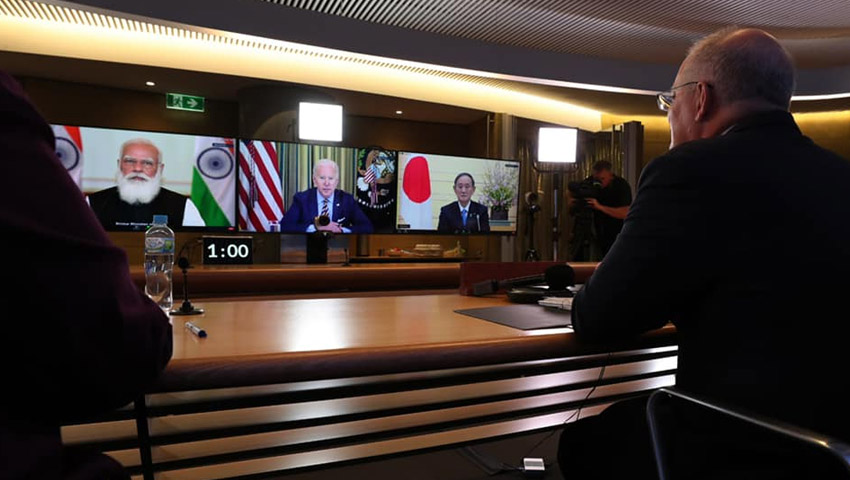Will the Quadrilateral Security Dialogue mean that the West should abandon Pakistan in the goal for geostrategic dominance in Asia?
To continue reading the rest of this article, please log in.
Create free account to get unlimited news articles and more!
Does the emerging Quadrilateral Security Dialogue mean that each nation expects other members to assume their alliances? What about their rivalries?
It’s too soon for the West to abandon India’s long-term adversary Pakistan, who sits at the forefront of the new US-Chinese Cold War and a pivotal position for the dominance of Asia.
Since the declaration of martial law by Mohammad Zia-ul-Haq in 1977, Pakistan has been south Asia’s geopolitical wildcard.
Following the Soviet invasion of Afghanistan, Pakistan’s religious zeal proved useful for United States’ foreign interests by providing a safe haven for Saudi-Wahhabi preachers and as a gateway for weaponry and mujahedeen to find their way into the anti-Soviet insurgency.
Their geostrategic position has been so volatile that even the Iranian revolutionary government attempted an outreach program when Ayatollah Khomeini was widely viewed across the Islamic world as the new leader of the Muslim anti-colonial zealotry.
The Sunni-Shia split in the country got so bad throughout the late ’70s and ’80s that thousands of Sunni tribesmen murdered hundreds of Shia in the 1988 Gilgit massacre.
This volatility is why it is critical that the west does not abandon the country. The reasons are endless: humanitarian, geostrategic and of course militarily.
In the post 9/11 world and the US invasion of Afghanistan, Pakistan has frantically searched for allies and in recent years the long-standing Pakistani and Turkish relationship has blossomed across military, trade and culture.
Arif Rafiq in the Middle East Institute went as far as to describe the alliance as an ‘entente’.
“The emerging Pakistan-Turkey entente now has the buy-in of Pakistan’s leading political parties and three military services, as well as the Turkish leadership. The partnership aids and, at times, complicates the quest of both countries for strategic autonomy as options in the West narrow. However, the potential of the Pakistani-Turkish entente will be constrained by the economic precarity of the two countries and the limited prospects for growth in trade in the near term,” Rafiq wrote.
Pakistan has undertaken an enhanced economic relationship with China – a natural partner to balance out the historic rivalry with India, and to provide the country with cheap capital to support the construction of basic infrastructure.
However, as written in Defence Connect Insight last week, not all of Pakistan’s citizens support this growing relationship.
Pakistani journalist Adnaan Aamir wrote that the Pakistani Taliban had commenced targeting Chinese officials.
“[Tehreek-e-Taliban Pakistan] is happy to further muddy the waters for Pakistan in its regional rivalry with India. Senior Pakistani officials have accused India of providing past support to the TTP to damage Pakistan. India denies such allegations, even in the face of claims of 'irrefutable evidence' that the TTP along with other groups based in Afghanistan have received some level of Indian support to mount attacks in Pakistan. But even if impossible to prove, TTP attacks on China’s interests in Pakistan could be claimed as a proxy for India in its rivalry with both powers,” Adnaan said.
“A further reason for a change of strategy may be that the TTP has decided to retaliate against China over the treatment meted out to Uighur Muslims in Xinjiang province, where there have been mass incarcerations in the name of countering terrorism.”
These are two interesting positions. Firstly, Adnaan argues that India may be covertly supporting the Pakistani Taliban to undertake an insurgency in the country. While this seems fantastical, the Taliban and other extreme religious tribal groups in the region have received funding from odder places.
The second is that the widespread controversy surrounding China’s treatment of Muslims has hindered China’s public opinion in the Muslim world.
Either or, both public attitudes toward Pakistan’s allies as well as the government’s geostrategy is in a state of flux. The country looks both to the West and East simultaneously, and while the government has continued the rightwards push into fundamentalism, many of the country’s loudest voices simply do not believe it is enough.
Analyst at Wikistrat Syed Fazl-e-Haider wrote in the Lowy Institute’s Interpreter last month that the government continues to placate extremist groups.
“On the TLP’s demand, the government of Prime Minister Imran Khan moved a parliamentary resolution for debate on the expulsion of the French ambassador over the publication in September last year of blasphemous caricatures by French magazine Charlie Hebdo. The resolution called for the protection of the sanctity of the Prophet. In return, TLP called off its protests across the country,” Fazl-e-Haider wrote.
Pakistan is a country where the public is out-of-line with the government, and where foreign state and non-state actors continuously weigh in to tilt the policy levers at all levels of government. The West should not use the emerging Quad dialogue as an excuse not to execute their foreign policy objectives in Pakistan.
Get involved with the discussion and let us know your thoughts on Australia's future role and position in the Indo-Pacific region and what you would like to see from Australia's political leaders in terms of partisan and bipartisan agenda setting in the comments section below, or get in touch with

 Login
Login







